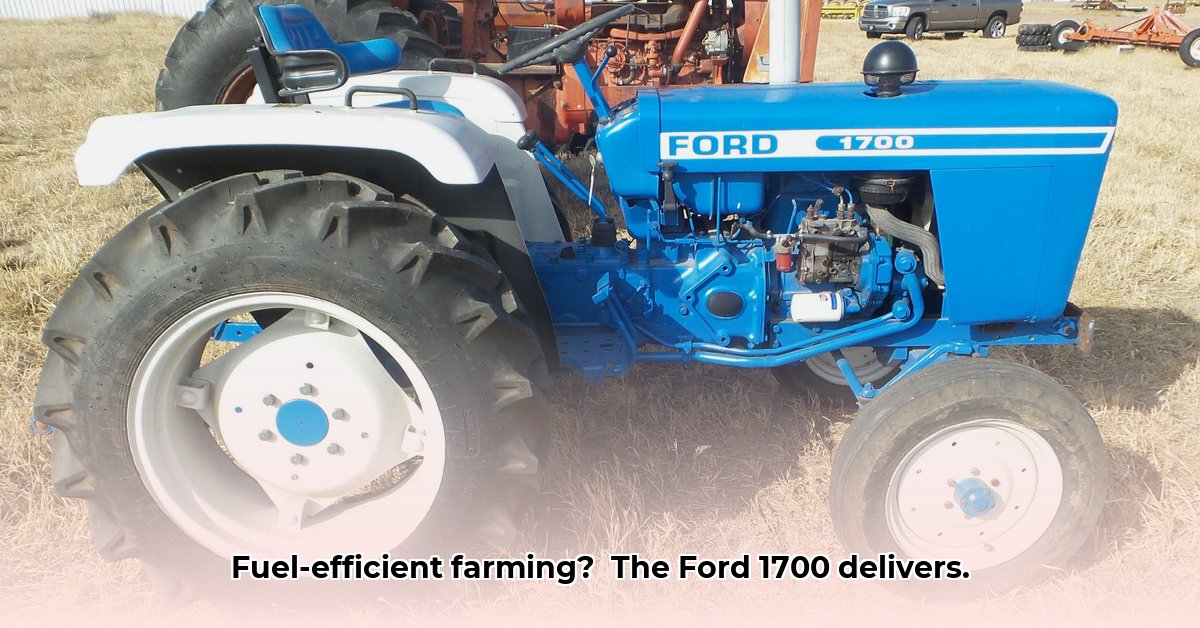
The Ford 1700 tractor, manufactured between 1979 and 1983, presents a compelling case study in the application of older agricultural technology to modern sustainable farming practices. While its 25-horsepower engine might seem modest compared to contemporary models, its compact size, efficient design, and surprising versatility offer unique advantages, particularly for smaller-scale farming operations. For more information on similar models, check out this page on Ford Tractor Problems.
Fuel Efficiency: A Foundation for Sustainable Practices
One of the Ford 1700's most attractive features is its fuel efficiency. Its smaller, 5.8-gallon fuel tank inherently leads to lower fuel consumption than that of larger tractors. This translates to substantial cost savings for farmers, a critical element in the economic viability of sustainable agriculture. Furthermore, reduced fuel consumption directly minimizes the tractor's carbon footprint, making it a comparatively environmentally friendly option. While precise data on fuel consumption per acre is unavailable, the potential savings over an entire growing season are significant. How much money could you save on fuel with the Ford 1700 compared to a modern, larger tractor?
Versatility: Adaptability for Diverse Farming Needs
The Ford 1700’s versatility enhances its sustainability appeal. Its compatibility with a wide array of attachments—including mowers, snow blowers, loaders, and backhoes—makes it a highly adaptable tool across diverse farming contexts. This adaptability is crucial for efficient, sustainable farming, allowing operators to perform various tasks with a single machine, reducing the need for specialized equipment. Consider its utility in maintaining orchards, tilling gardens, and even clearing snow—all using the same tractor. Its maneuverability also makes it ideal for smaller fields or confined spaces, often characteristic of sustainable farming practices. Isn't this adaptability a significant advantage for small-scale operations?
Power and Limitations: Matching the Machine to the Task
It's important to acknowledge the Ford 1700's limitations. Its 25 horsepower engine is unsuitable for large-scale commercial farming or heavy-duty tasks more easily handled by larger, modern tractors. However, this limitation is not a universal disqualifier. For smaller farms, orchards, vineyards, or hobby farms, its power output is sufficient, and its fuel efficiency provides a cost-effective solution. What tasks are particularly well-suited to this tractor’s capabilities?
Mechanical Simplicity: A Sustainable Design Feature?
The Ford 1700 features a straightforward mechanical design, including manual steering and mechanical brakes, a feature which could contribute to its sustainability profile. The reduced number of electronic components potentially translates to lower manufacturing energy consumption, a longer lifespan, and simpler, less expensive repairs. This inherent simplicity may align with some definitions of sustainability. However, this advantage comes with a trade-off: sourcing replacement parts for a vintage machine like the Ford 1700 can be challenging. Does the simplicity of the Ford 1700 outweigh the potential difficulties in acquiring replacement parts?
Environmental Impact: The Need for Further Research
A comprehensive life cycle assessment (LCA) is needed to fully evaluate the Ford 1700's total environmental impact, taking into account manufacturing, transportation, usage, and disposal. An LCA would provide a much more complete picture of its overall sustainability. Currently, such data is lacking, highlighting a critical area for future research. Until a comprehensive LCA is conducted, definitive claims about its "green" attributes remain premature. What further data would strengthen the argument for the Ford 1700's sustainability?
Actionable Steps for Stakeholders
A collaborative effort is needed to better harness the Ford 1700's potential benefits. Here is a breakdown of recommended actions for specific stakeholders:
Key Takeaways:
- Fuel Efficiency: The Ford 1700 offers significant fuel savings compared to larger tractors.
- Versatility: Its adaptability makes it suitable for various farming tasks.
- Limitations: It lacks the power for large-scale operations.
- Environmental Impact: Further research is vital for a complete assessment.
The Ford 1700 exemplifies that sustainable agriculture doesn't always necessitate the latest technology. While limitations exist, its fuel efficiency and suitability for specific farming contexts suggest a valuable role in sustainable practices. However, further research is crucial to fully understand and optimize its potential within the broader context of environmentally conscious farming.